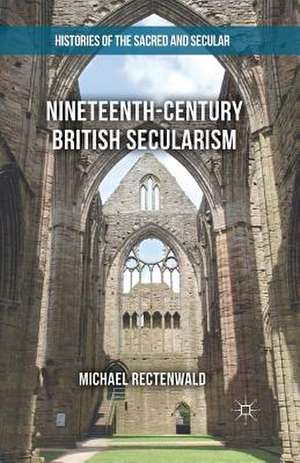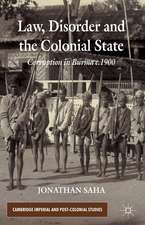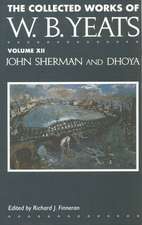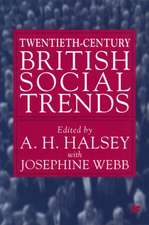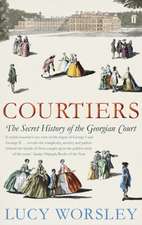Nineteenth-Century British Secularism: Science, Religion and Literature: Histories of the Sacred and Secular, 1700–2000
Autor Michael Rectenwalden Limba Engleză Paperback – 29 mar 2018
| Toate formatele și edițiile | Preț | Express |
|---|---|---|
| Paperback (1) | 278.64 lei 6-8 săpt. | |
| Palgrave Macmillan UK – 29 mar 2018 | 278.64 lei 6-8 săpt. | |
| Hardback (1) | 528.80 lei 6-8 săpt. | |
| Palgrave Macmillan UK – 8 feb 2016 | 528.80 lei 6-8 săpt. |
Din seria Histories of the Sacred and Secular, 1700–2000
- 15%
 Preț: 585.73 lei
Preț: 585.73 lei -
 Preț: 384.31 lei
Preț: 384.31 lei - 15%
 Preț: 645.10 lei
Preț: 645.10 lei -
 Preț: 384.09 lei
Preț: 384.09 lei - 15%
 Preț: 695.53 lei
Preț: 695.53 lei -
 Preț: 213.05 lei
Preț: 213.05 lei -
 Preț: 268.76 lei
Preț: 268.76 lei - 15%
 Preț: 637.89 lei
Preț: 637.89 lei - 18%
 Preț: 890.37 lei
Preț: 890.37 lei -
 Preț: 386.22 lei
Preț: 386.22 lei - 18%
 Preț: 781.45 lei
Preț: 781.45 lei - 18%
 Preț: 720.70 lei
Preț: 720.70 lei -
 Preț: 349.74 lei
Preț: 349.74 lei - 15%
 Preț: 635.01 lei
Preț: 635.01 lei - 18%
 Preț: 783.50 lei
Preț: 783.50 lei -
 Preț: 451.48 lei
Preț: 451.48 lei - 15%
 Preț: 588.50 lei
Preț: 588.50 lei -
 Preț: 392.37 lei
Preț: 392.37 lei -
 Preț: 390.63 lei
Preț: 390.63 lei -
 Preț: 391.61 lei
Preț: 391.61 lei
Preț: 278.64 lei
Nou
Puncte Express: 418
Preț estimativ în valută:
53.32€ • 55.35$ • 44.46£
53.32€ • 55.35$ • 44.46£
Carte tipărită la comandă
Livrare economică 22 martie-05 aprilie
Preluare comenzi: 021 569.72.76
Specificații
ISBN-13: 9781349690619
ISBN-10: 1349690619
Pagini: 257
Ilustrații: VI, 257 p.
Dimensiuni: 140 x 216 mm
Greutate: 0.31 kg
Ediția:1st ed. 2016
Editura: Palgrave Macmillan UK
Colecția Palgrave Macmillan
Seria Histories of the Sacred and Secular, 1700–2000
Locul publicării:London, United Kingdom
ISBN-10: 1349690619
Pagini: 257
Ilustrații: VI, 257 p.
Dimensiuni: 140 x 216 mm
Greutate: 0.31 kg
Ediția:1st ed. 2016
Editura: Palgrave Macmillan UK
Colecția Palgrave Macmillan
Seria Histories of the Sacred and Secular, 1700–2000
Locul publicării:London, United Kingdom
Cuprins
Introduction: Secularity or the Post-Secular Condition
1. Carlyle and Carlile: Late Romantic Skepticism and Early Radical Freethought
2. The Principles of Geology: A Secular Fissure in Scientific Knowledge
3. Holyoake and Secularism: the Emergence of 'Positive' Freethought
4. Secularizing Science: Secularism and the Emergence of Scientific Naturalism
5. The Three Newmans: A Triumvirate of Secularity
6. George Eliot: The Secular Sublime, Post-secularism, and 'Secularization'
Epilogue: Secularism as Modern Secularity
1. Carlyle and Carlile: Late Romantic Skepticism and Early Radical Freethought
2. The Principles of Geology: A Secular Fissure in Scientific Knowledge
3. Holyoake and Secularism: the Emergence of 'Positive' Freethought
4. Secularizing Science: Secularism and the Emergence of Scientific Naturalism
5. The Three Newmans: A Triumvirate of Secularity
6. George Eliot: The Secular Sublime, Post-secularism, and 'Secularization'
Epilogue: Secularism as Modern Secularity
Notă biografică
Michael Rectenwald is Professor of Global Liberal Studies at New York University, USA. He is editor of Global Secularisms in A Post-Secular Age (2015) and Academic Writing, Real World Topics (2015). He has published essays on secularism in The British Journal for the History of Science, The International Philosophical Quarterly, and George Eliot in Context.
Textul de pe ultima copertă
Nineteenth-Century British Secularism offers a new paradigm for understanding secularization in the nineteenth century. It addresses the crisis in the secularization thesis by foregrounding a nineteenth-century development called 'Secularism' – the particular movement and creed founded by George Jacob Holyoake from 1851 to 1852. Nineteenth-Century British Secularism rethinks and reevaluates the significance of Holyoake's Secularism, regarding it as a historic moment of modernity and granting it centrality as both a herald and exemplar for a new understanding of modern secularity. In addition to Secularism proper, the book treats several other moments of secular emergence in the nineteenth century, including Thomas Carlyle's 'natural supernaturalism', Richard Carlile's anti-theist science advocacy, Charles Lyell's uniformity principle in geology, Francis Newman's naturalized religion or 'primitive Christianity', and George Eliot's secularism and post-secularism.
